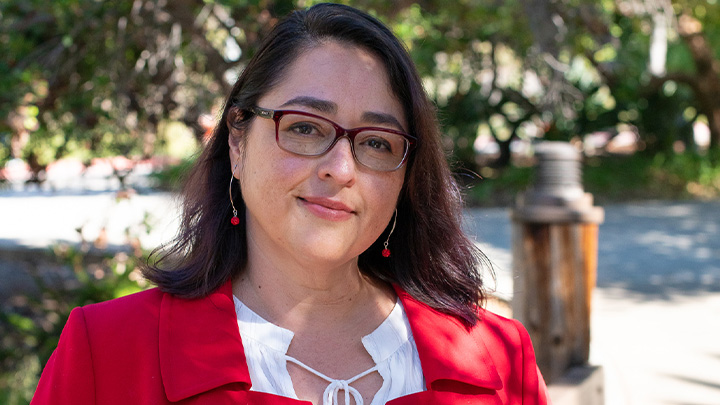Baldonado-Ruiz Elected to NCTE Secondary Steering Committee

As an assistant professor of literacy in San Diego State University’s School of Teacher Education, Mónica Baldonado-Ruiz has a significant impact on reading and writing education across the region. This coming academic year — her second on campus — she’ll teach the English Language Arts (ELA) methods course for the majority of SDSU’s secondary teaching credential candidates.
Thanks to a new appointment, she’ll also now have a major impact at the national level.
Baldonado-Ruiz was recently elected to serve on the Secondary Section Steering Committee for the National Council of Teachers of English (NCTE), a more than 100-year-old organization that aims to use language and literacy to pursue equity for all students.
"I'm really excited about being able to make decisions about the direction that the organization is going to take in secondary English Language Arts,” said Baldonado-Ruiz. “We're going to be looking at a lot of interesting developments like book bans and legislation asking teachers to ignore our history. We’ll then determine how, as an organization, NCTE can address those things."
The work aligns well with Baldonado-Ruiz’s research interest and expertise in the areas of Culturally Sustaining Pedagogy. A former classroom teacher who taught ELA for 17 years in Latinx and Native communities in New Mexico and Arizona, she is particularly excited about NCTE’s momentum toward decolonial practices — embracing approaches to teaching rooted in indigenous cultures.
"I think that's one of the reasons that the people who were elected are there," she says.
On the research front, Baldonado-Ruiz returned to her home state of New Mexico over the summer to conduct a literacy autoethnography — an exploration of her own literacy practices and learning growing up in the small town of Algodones. She also studied her grandmother’s experiences learning in a one-room schoolhouse in the rural northern part of the state in the 1920s and 30s.
It was a powerful — at times painful — experience.
"School was not always a good place for me growing up, so going back to where I was taught in elementary school was hard,” she said. “The ways that it has changed and the ways that it's still the same gave me pause. But it was really good to think about what I do to train teachers who are going to be working with similar populations of people.
“It was a reminder that what I do is really important. I want to make sure that cultural and linguistic practices are respectful and preserving of different cultures and languages.”

